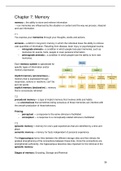Samenvatting
Summary Chapter 7; Psychological science 7th edition (Michael Gazzaniga)
- Instelling
- Rijksuniversiteit Groningen (RuG)
This is a summary of the 7th chapter of the book "Psychological science" by Michael S. Gazzaniga. Written by a first year psychology student.
[Meer zien]





